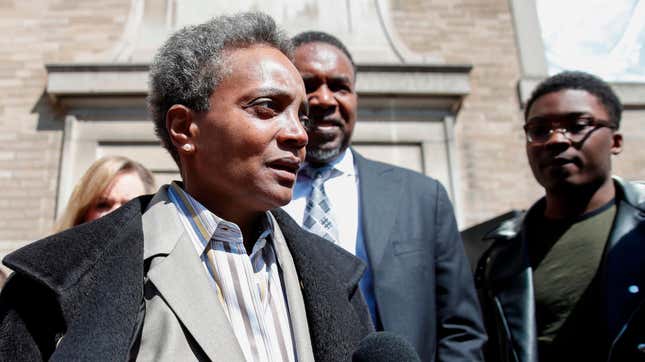
Chicago Mayor Lori Lightfoot arrived at a hospital Saturday night to offer moral support for wounded cops and their colleagues, but some officers on the scene turned their backs on her.
According to the Chicago Tribune, two officers were shot this weekend and one of them died. The father of one of the officers scolded Lightfoot, who stood there and listened. When she tried to approach a group of cops, they walked away and turned their backs. Lightfoot walked away.
Lightfoot’s office released a statement Monday, saying she was present at the emergency department to offer support and condolences to the families involved and reaffirm her support for the police force.
“In a time of tragedy, emotions run high and that is to be expected,” according to the statement. “The mayor spoke to a range of officers that tragic night and sensed the overwhelming sentiment was about concern for their fallen colleagues.”
During her run for mayor, in 2019, Lightfoot touted her time as a federal prosecutor to earn support from police unions and firefighters. But her time in office has shown a very complex relationship with law enforcement, as well as activists who say she isn’t doing enough to address police brutality—especially since video of Adam Toledo’s death was released to the public.
ABC7 Chicago reported on some of those complaints:
Rod Wilson is the executive director of the Lugenia Burns Hope Center, an organization aimed at increasing civic engagement in the Bronzeville neighborhood.
“She ran off saying she wanted to do some things and she hasn’t gotten them done,” he said.
Wilson cited Lightfoot’s handling of police reform, specifically the city not meeting the deadlines of the consent decree and her stance on community oversight of the police.
“We thought we were going to get something different, but instead we are getting more of the same,” he said.
Asiaha Butler, the executive director of the Resident Association of Greater Englewood, was a member of Lightfoot’s transition team’s good governance committee. Butler said she and others on the committee have been disappointed by the mayor.
“It has been the gamut around COVID. It was around civil unrest. It’s been around the roll out of INVEST South/West,” said Butler, referencing the mayor’s program bringing resources to 10 neighborhoods on the South and West Sides.
She has basically been accused of being too soft on cops and, according to the Appeal, she has earned that reputation:
Since taking the mayor’s office in 2019, she has failed to fulfill basic campaign promises regarding police reform. As the Chicago Tribune noted earlier this month, Lightfoot has still not unveiled a new plan for civilian oversight of the police department,something she promised to do within her first 100 days of office. Her office has repeatedly missed deadlines set by federal monitors from the U.S. Department of Justice, who began overseeing the police after the McDonald shooting. In her first year in office, her administration missed more than 70 percent of its reporting deadlines; in her second year, her office missed 60 percent. During the 2020 uprisings that occurred after George Floyd’s death, Lightfoot’s officers were filmed brutalizing peaceful protesters—while her administration approved raising bridges to keep demonstrators from wealthy downtown areas.
And her department has stalled public release of police misconduct videos. In December, a woman named Anjanette Young publicized body-worn camera footage that showed Chicago police officers raiding her home with guns drawn—while she was nude and changing. The police had failed to verify that it was raiding the correct address and raided her home by mistake.
Young shared the footage with the local CBS affiliate—but hours before CBS was set to air it, lawyers working for Lightfoot’s administration filed a court motion attempting to block the release. Lightfoot’s attorneys also asked the court to discipline Young for allegedly violating a confidentiality order she’d signed with the city.
Of course, she isn’t the only big city mayor to be shunned by cops. The NYPD turned its back on New York City Mayor Bill de Blasio in 2015, as he spoke at a slain officer’s funeral. He, too, ran on a police reform platform. He even used his own son, big afro and all, to win over Black voters with an ad vowing to end stop-and-frisk. As his second and final term comes to an end, it is universally accepted that de Blasio failed to reign in the NYPD and they are bolder than ever in their disdain for him—even though his tenure was spent defending some of their horrible acts, including officers ramming protesters with their vehicles in May of 2020 during a George Floyd protest.
The reality is that cops only support politicians who allow them to kill and abuse with impunity. Lightfoot, who has also supported cops by spending close to $300 million on the department that some aldermen and activists believe should have gone to small businesses, is in an interesting position of another big city chief executive who is learning she’ll never satisfy cops. Nothing she does will make them happy and being tough on protesters will not endear them to her. When she calls for even the most reasonable police reforms, they resist.
Perhaps Lightfoot will realize that focusing on the people police hurt rather than the perpetrators of the harm (the cops) will be a more worthy enterprise for the rest of her term as mayor.

